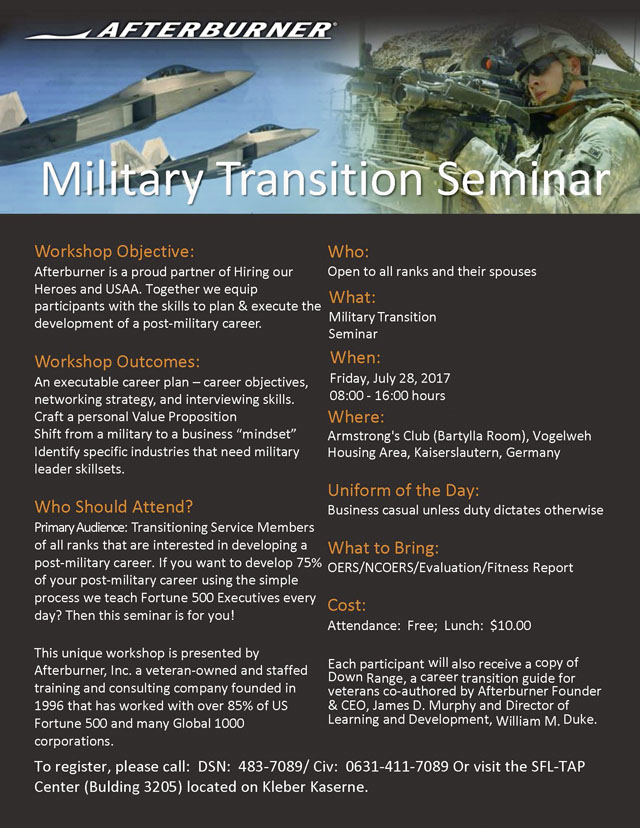“Soldier For Life” isn’t just another catch phrase. At least not when you look at all that it entails to provide a wide range of transition support services to separating or retiring service members.
As part of that effort, the U.S. Army Garrison Rheinland-Pfalz SFL-Transition Assistance Program sponsors a free upcoming event open to all service members of all U.S. military branches, their spouses, veterans and civilians to provide the knowledge, skills and self-confidence necessary to be competitive and successful in the global workforce and to achieve post-military service goals.
The Afterburner Military Transition Seminar takes place from 8 a.m. to 4 p.m July 28 at Armstrong’s Club on Vogelweh Housing.
“We want to encourage transitioning service members to make informed decisions through benefits counseling and employment assistance to ensure a successful transition from active duty,” said Mary Steele, contractor manager for the SFL-TAP at Kleber Kaserne.
The Afterburner seminar (partnered with Hiring Our Heroes and USAA) is geared toward developing an executable career plan with objectives, networking strategy, interviewing skills, she explained, adding that it also focuses on “how to shift from a military to a business mindset and how to identify specific industries that need military leader skill sets.
The event features leading subject matter experts in the commercial and private sector of U.S. industry.
“Today’s civilian job market is highly competitive and demands well-prepared, articulate individuals, able to stand out from their competition, so attending job fairs, transition hiring events, career skills programs and transition seminars, help service members to develop a comprehensive strategy to land the right job,” said Steele.
Post-military employment is rated as one of the biggest challenges facing veterans, she added, citing that a national survey of active and retired military personnel found that 38 percent consider the transition back to civilian life to be the most significant challenge; with 24 percent believing that finding civilian employment is the greatest challenge.
That’s why “Soldier For Life” is much more than a buzzword.
“TAP is a shared responsibility,” said Steele, “and requires a coordinated effort by a number of federal agencies to include the Department of Defense, Department of Labor, and Department of Veteran Affairs.”
She also emphasized that while service members have specific responsibilities regarding their separation and transition, “SFL-TAP is a commander’s program at the lowest level and requires leadership support in order for it to be successful.”



